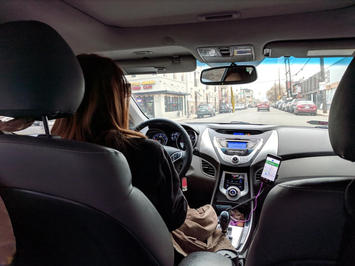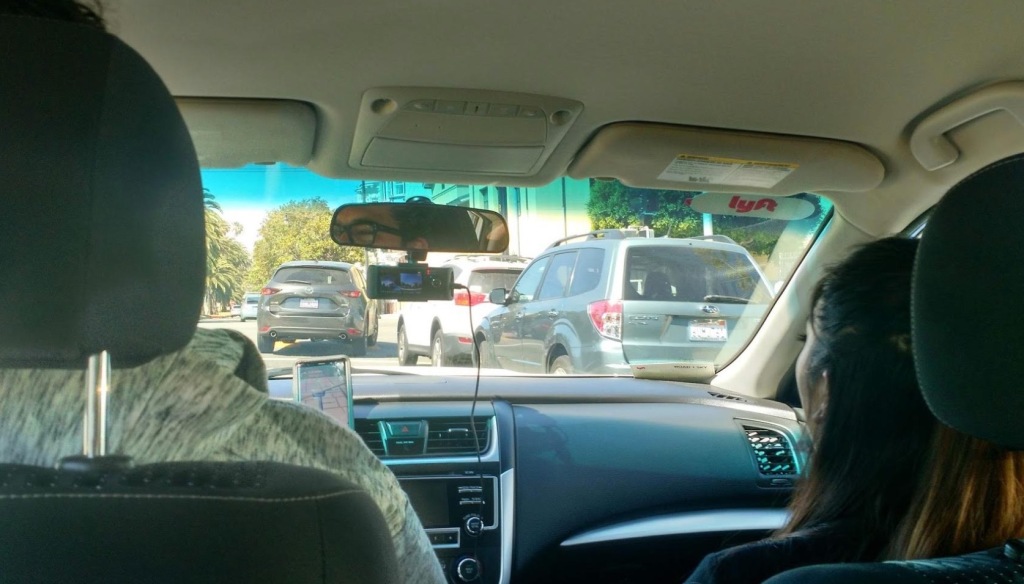
I occasionally find myself in an Uber or Lyft. I like to hear about the lives of the people who do the driving. They’re overwhelmingly from the distant suburbs and drive in to the city to collect fares. An hour away is the most typical distance. I ask why they don’t just drive near where they live. The numbers don’t add up. Not enough volume. The distances are too far and the empty round trips burn up miles with no income. And the price they get for each trip is geographically sensitive based on supply and demand. A driver can pick up and drop off fares continuously all day and all night in the city at a higher rate than a few scattered fares in the suburbs with a lower rate. Commuting in to town is wildly more profitable.

A neighbor was in the hospital with some health issues a while back so I hopped a Lyft Line to visit him and his wife. Faster than biking uphill. Easier than parking in the city. Sooooooo much better than waiting for a bus that may or may not appear. $8. A bit pricey, but it’s a once-in-a-while thing. What’s not to love? I walked back home downhill on a sunny Saturday. My Lyft driver Andy was busy chatting with a young Asian woman in the front seat. I was in back with a Latina. All heading to different destinations near each other.
The Asian also Lyfts and Ubers on the side. She was comparing notes with Andy. Worst trip? A drug deal going down in the vehicle. A guy and two women. Andy was uncomfortable with the sale of federally regulated substances (evidently the hard stuff) in his car, but he kept his eyes on the road and pretended not to notice. Then one of the women insisted on some product in exchange for services rendered. The dealer wasn’t interested. Cash money only. Things escalated and he got physical with her. That’s when Andy pulled the car over and told everyone to get out. He couldn’t tolerate a guy hitting a woman in his presence. He doesn’t take fares in that particular town anymore.
In Denver I chatted with a 30-ish woman driver about her situation. She left West Virginia looking for work. She rents an apartment in Colorado Springs an hour away since rents are half what they are in Denver. This arrangement is what economists call geospatial arbitrage. Her commute in and out of the city is paid for with airport fares from suburbia. She earns 90% of her income from Lyft and Uber. She said she’s saving up to buy a house back in Appalachia. She had a pleasant hippy vibe. She just got her certificate for therapeutic massage and a table at a work share space in a trendy neighborhood. She talked about how she liked Colorado because people ask if she enjoys her work and what she’s striving to achieve in her personal growth. No one back home in West Virginia ever asks about happiness. They focus more specifically on bread and butter and keeping warm and dry. But it’s home and West Virginia is beautiful and the kind of place where you can buy a house on the cheap and be close to your people. She’ll never buy a home in Denver. Never.
This piece originally appeared on Granola Shotgun.
John Sanphillippo lives in San Francisco and blogs about urbanism, adaptation, and resilience at granolashotgun.com. He's a member of the Congress for New Urbanism, films videos for faircompanies.com, and is a regular contributor to Strongtowns.org. He earns his living by buying, renovating, and renting undervalued properties in places that have good long term prospects. He is a graduate of Rutgers University.













What???
"Geospatial arbitrage"?
For real? Intelligent people actually use this contrivance?
Also, it's purely a matter of personal preference, but I myself would not want to live in any community where people frequently inquired after my happiness, or my "personal growth."
First Para Tells Why Suburban Car Ownership Could Survive
John...
Your first paragraph also reveals why the idea of autonomous vehicle fleets replacing individual ownership may not work in the suburbs. The same problem there (where 85 percent of Americans live) as for Lyft and Uber drivers seeking to survive.
A very nice article
Best,
Wendell Cox
Demographia
www.demographia.com